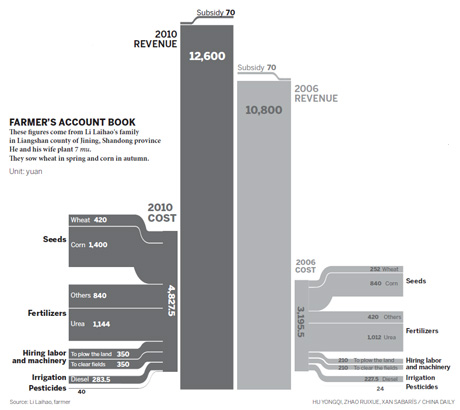Hot Issues
Food security threat grows as farmers plow lonely furrow
Updated: 2011-03-09 07:34
By Hu Yongqi and Zhao Ruixue (China Daily)

Subsidies, other help
The central government started to subsidize farmers in 2004 at 10 yuan per mu in Li Laihao's county, Liangshan. "We all believe the intention of the subsidy was to improve the lives of the farmers," Li said. "But one thing the government has to think about is the real effect."
In his case, 70 yuan a year provides no real help. And he finds it unfair that families who have abandoned their contracted land are still paid the subsidy.
In 2006, farmers in Jiyang county became eligible for a subsidy to offset increased prices for agricultural materials. The subsidy started at 14.2 yuan per mu; this year it's up to 84.45 yuan per mu. Li Shuwen said many farmers think that any subsidy under 100 yuan is nothing.
"The crop price should be in the hands of the market to increase in line with demand," said Zheng, the professor at Renmin University. "That will inspire more people to farm."
But if crop prices increase quickly, poor urban residents will suffer. In this case, Zheng suggested that China let crop prices be driven by the market and that it consider something like the United States' food stamp program to help poor families in cities.
That program, recently renamed SNAP (Supplemental Nutrition Assistance Program), provides assistance to low-income people in buying most food items but no prepared foods, alcohol, soap or the like. Most people who meet federal income, resource and work requirements are eligible as long as they are not able-bodied and unemployed.
For example, in New York state, a three-member family that earns less than $1,984 a month can pay $30 for $50 in food-buying power. Most states provide the food "stamps" in the form of an access card, something like a debit card, that can be used in certain grocery stores.
"In this way," Zheng said, "the value of crops will be recognized and people will keep an eye on farming, and the food security for the country will be ensured."
Zuo Chuanbao, general office director of the Jiyang Agriculture Bureau, disagreed. He said that crop prices are essential to people's livelihood and to reduce national inflation. Therefore, he said, the government should carry on its policy of keeping crop prices low.
Jiang Xueqing contributed to this report.
Specials

Tea-ing up
More turning to Chinese tea for investment opportunities like vintage wine

A cut above
The ancient city of Luoyang is home to a treasure trove of cultural wonders.

Rise and shine
The Chinese solar energy industry is heating up following recent setbacks in the nuclear sector